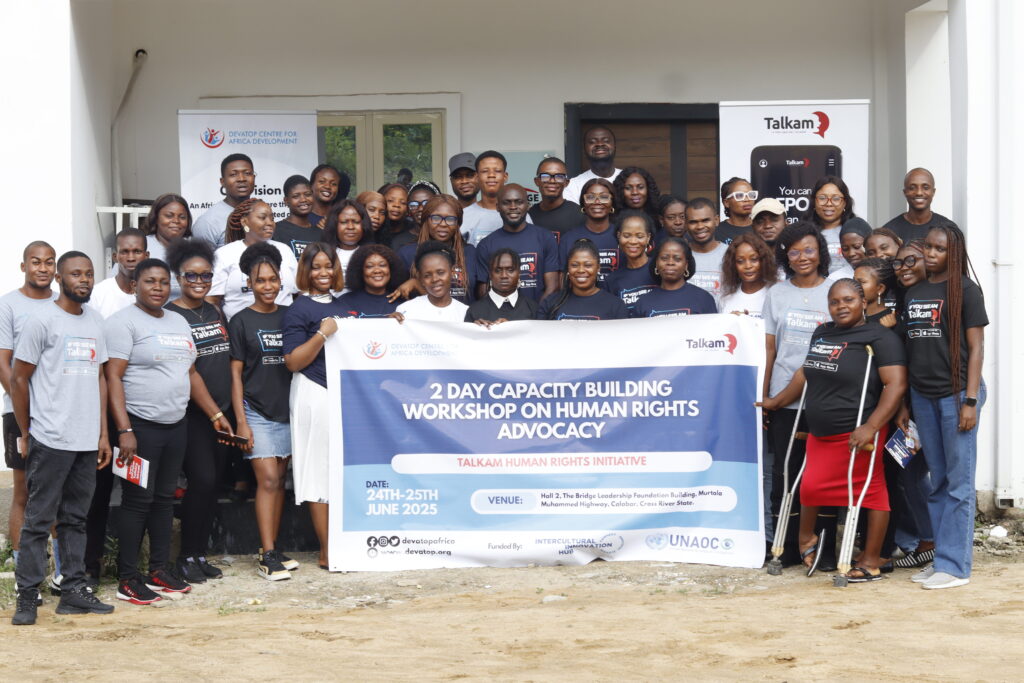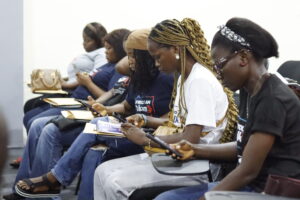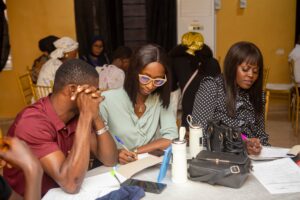TWO DAY CAPACITY BUILDING WORKSHOP FOR TALKAM HUMAN RIGHTS ADVOCATES IN CALABAR AND LAGOS STATE.

From June 24 to 25, 2025, the fight for human rights in Nigeria gained new energy as Devatop Centre for Africa Development organized simultaneous two-day capacity building workshops for over 100 Talkam Human Rights Advocates in Lagos and Calabar State. The workshops, held at Nkem Events Place in Festac Town, Lagos, and The Bridge Leadership Foundation Building in Calabar, Cross River State, brought together participants passionate about defending the rights of the vulnerable and leveraging technology to drive advocacy. The programs were designed to equip participants with the knowledge, tools, and skills needed to identify and address human rights violations in their communities using the Talkam Human Rights App.
The sessions began with welcome remarks from representatives of The Bridge Leadership Foundation and Devatop, including Project Lead Janet Homo, who introduced the Talkam Human Rights Initiative Project and emphasized its goal of protecting human rights through capacity building and technology. She noted that the project, funded by The Intercultural Innovation Hub, seeks to empower advocates to identify violations, report them using digital tools, and engage in community-driven action. Participants were reminded that human rights are universal, inalienable, and embedded in African frameworks such as the African Charter on Human and Peoples’ Rights, and that defending them is a shared responsibility of individuals, communities, and governments.
The workshops introduced participants to the principles, myths, and realities of human rights and guided them on identifying violations within their local contexts. Through interactive exercises using the Problem Tree Methodology, participants analyzed issues like child trafficking, sexual abuse, gender-based violence, and police brutality, breaking them down into root causes, visible effects, and systemic drivers. Across both states, common root causes emerged: poverty, ignorance, weak governance, corruption, and harmful cultural practices. Groups presented findings that highlighted the long-term social and psychological consequences of violations, from school dropouts and teenage parenting to depression, trauma, and community underdevelopment. These exercises not only exposed visible abuses but also helped participants reflect on the structural and cultural drivers that perpetuate cycles of exploitation.
The sessions also emphasized the importance of digital advocacy as a transformative tool for social change. Facilitators including Kebe Ikpi and Noreen Abalaka demonstrated how social media platforms like Twitter, TikTok, WhatsApp, and Facebook can be used to raise awareness, amplify community voices, and pressure duty bearers into action. Participants learned to craft compelling advocacy messages, create digital campaigns, use hashtags strategically, and adhere to principles of ethical storytelling and online safety. They were encouraged to see digital spaces as powerful arenas for making invisible violations visible, influencing public opinion, and holding violators accountable.
A major highlight of the workshops was the introduction and practical demonstration of the Talkam Human Rights App, an innovative civic tech solution developed by Devatop Centre for Africa Development. Facilitators including Jennifer Ikwueze and Janet Homo explained that the app is a global platform that allows individuals and organizations to report human rights abuses in real time, access case management tools, and learn about human rights through online courses. Participants downloaded the app, navigated its features such as the Talkam Room for community engagement, and were guided on reporting cases accurately and securely. They also recited the project’s energizing slogan, “If You See Am, Talkam!” as a call to action for collective vigilance and accountability.
The practical aspect of the workshops culminated in the development of community action plans. Participants were divided into groups to design realistic strategies for promoting human rights advocacy and integrating the Talkam App into community initiatives. Plans included conducting school sensitization campaigns on child rights and human trafficking, organizing roadshows and PTA engagements, hosting community radio talk shows, sensitizing religious institutions, producing short advocacy skits, and creating multilingual campaigns to ensure inclusive awareness. Some groups proposed hospital outreach to reach nursing mothers and employers of domestic staff, while others designed feedback loops and weekly counseling sessions to sustain community engagement. These presentations showcased creativity, collaboration, and a commitment to transforming knowledge into actionable grassroots impact.
Throughout the two days, participants engaged in lively discussions, asked practical questions about handling real-world cases, and shared personal reflections on how the training reshaped their understanding of advocacy. Feedback was overwhelmingly positive, with participants expressing gratitude for the tools, clarity, and confidence gained. They highlighted the program as not only informative but also transformative, giving them the ability to act ethically, document violations, and champion justice. The workshops concluded with active engagement on the Talkam App, networking among participants, shared meals, and a spirited group photo session to mark the beginning of their journey as empowered human rights advocates.
By the close of the events in both Lagos and Calabar, one message resonated clearly: human rights advocacy is no longer abstract—it is actionable, digital, and community-driven. With the Talkam App as their ally, participants left prepared to expose violations, amplify the voices of the vulnerable, and inspire systemic change across Nigeria.
